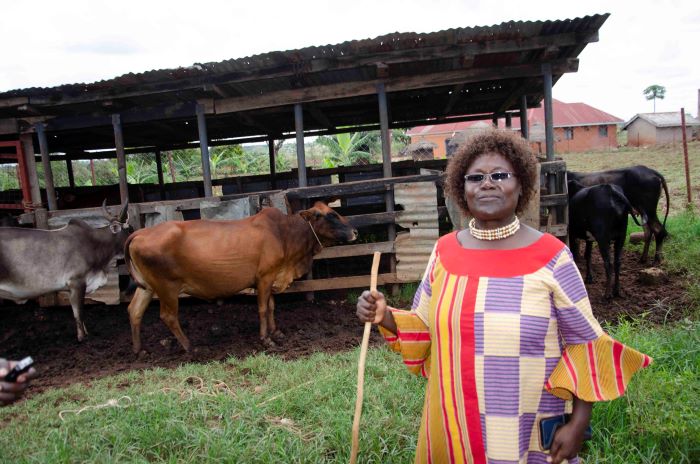DOKOLO, April 17, 2024 – Dr Rosemary Alwoc Ogwal, former contestant for Dokolo District Woman Member of Parliament has urged communities in the district to take up livestock keeping as the best option to generate household income and transform their households, and the country and large.
Livestock farming involves management and breeding of domestic or farm animals for purposes of obtaining their products for commercial gain. A livestock farmer earns income from a variety of products which include cattle selling, beef, milk, and manure.
Talking of how she is benefiting from her farm Alwoc said: “Now that I am not involved in politics, I am here in Adok Sub-county as a dairy farmer because I noted that life is not only in politics but farming as well.”
Alwoc, a daughter to former Dokolo District Woman Member of Parliament, the late Cecilia Atim Ogwal contested on the Forum for Democratic Change [FDC] party ticket in the by-election held to replace her late mother in parliament last month but lost. She said she gets 40 litres of milk every day both from exotic and local breeds on the family farm.
“We are selling the milk locally even though some of is consumed at home,” said Awoc who contested and lost to Sarah Aguti Nyangkori of the Uganda People`s Congress [UPC].
At the farm, she has 10 exotic cows and 70 local breeds, hoping to have more animals in the near future such that the communities around could replicate the same project in their homes.
She said when she was young, her grandfather had a lot of cattle from which he earned revenue to send his children to school and cater for other necessities at home.
She added: “It’s the Lango culture to keep cattle and using it to get milk and capital investment as well,” she said. “It is something which I saw when I was growing up as a kid.”
According to Alwoc, the family farm was established by her mother in an attempt to motivate the locals in Dokolo district to fight poverty.
She added that they are hoping to increase the number of animals on the farm to 200 within three years. “I want to continue with the project to drive our communities into the direction of wealth creation,” she added.
However, Jimmy Okello, a resident of Dokolo district said livestock farming requires a lot of money, which most farmers in the district don’t have.
He urged financial institutions like banks and microfinance institutions not to ask farmers willing to start large-scale farming for collateral.
According to the National Livestock Census [NLC] 2021, approximately 72.8 percent of households in Uganda, totalling 6.8 million households, are engaged in livestock keeping, owning at least one type of livestock.
The NLC carried out by the Uganda Bureau of Statistics [UBOS] reveals a cattle population of 14.5 million, marking a 26.9 percent increase from 11.4mln reported in 2008, with 77 percent being indigenous breeds and 23 percent exotic/cross.
Uganda currently produces 3.67 billion litres of milk set for 2024/2025. However, this falls short of the country’s milk production potential, which stands at 10bln litres per annum.
According to Bob Twinomugisha, Senior Economist, Macroeconomics and Trade at Uganda Development Bank [UDB], challenges such as livestock diseases, low uptake of high-grade exotic cattle, and limited access to extension services hinder the sector’s potential.
A report by the Economic Policy Research Centre [EPRC] says Ugandans farmers could potentially generate an additional US$ 300 million in revenue from the livestock sector. However, Twinomugisha says the predominance of indigenous breeds suggests a low productivity level in the country’s livestock sector, calling for the enhancement of productivity in the sector.
“Traditional production systems such as tethering, free-range as well as community grazing, dominate, indicating potential challenges with space and resource management,” he says, adding that access to finance remains a critical barrier for smallholder farmers and entrepreneurs despite the sector’s pivotal role in the economy and rural livelihoods.
“Enhancing productivity in Uganda’s livestock sector requires improving animal health, promoting better breeding practices, enhancing access to quality feed and water, and providing training on modern farming techniques, all of which necessitate affordable financing, which he said UDB is providing, alongside non-financial services.
https://thecooperator.news/naro-appoints-new-head-of-livestock-research-nalrri/
Buy your copy of thecooperator magazine from one of our country-wide vending points or an e-copy on emag.thecooperator.news
